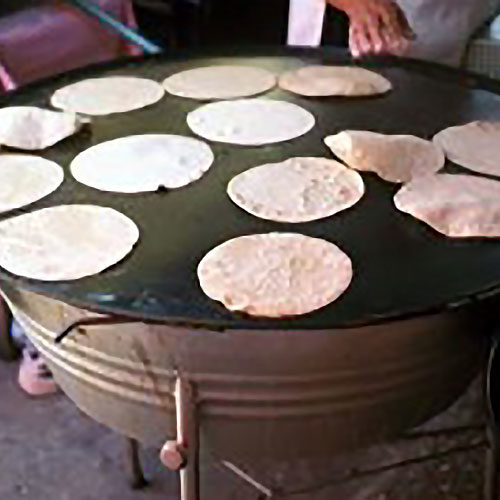When Mexicans say “tortillas,” you usually bet that they are not thinking of the blah versions of flour tortillas so popular in the United States — not much different from all those other flabby all-purpose “wraps.” Nearly everywhere in Mexico, the bread of life is corn tortillas. The very best ones use fresh masa ground from the finest Mexican corn, and will always have a slight edge over tortillas made from U.S.-grown corn. However, we can still make excellent tortillas here.
Please try this at least once with fresh masa. Even though tortillas from masa harina are all right for everyday purposes, you will taste a striking difference with real masa. The following recipe is a standard pan-Mexican formula for basic corn tortillas — but Veracruz is also known for some fascinating tortilla variations.

Corn Tortillas (Tortillas de maíz)
Ingredients
- 1 pound (about 3 cups) finely ground fresh masa or reconstituted masa made by mixing 2 cups masa harina to a smooth, firm dough with about 1 cup lukewarm water
- 2-3 teaspoons vegetable oil or as needed
Instructions
- Lightly work the masa with your fingers to test the consistency; it should be like a slightly stiff but pliable cookie dough. Work in up to 2-4 tablespoons water if necessary.
- Make an anti-stick liner for your tortilla press by cutting open two sides of a 1-quart zip-closing plastic freezer bag (or other heavy-duty plastic bag of the same size) to form a long rectangle about 12 x 6 inches. Open the press and place the plastic strip in it with the creased edge next to the hinge.
- Dampen your hands with cool water and shake off the excess. Shape the masa into 10-12 ping-pong-sized balls, occasionally remoistening your hands and covering the masa balls with a damp cloth as they are done.
- Heat a griddle or medium-sized cast-iron skillet over high heat until a drop of water sizzles on contact. Moisten a bunched-up paper towel with a dab of the vegetable oil and quickly rub it over the griddle. Now press a ball of masa into a tortilla by placing it in the center of the tortilla press between the two plastic flaps, lowering the hinged top, and pressing on the handle. You want a round of dough 5-6 inches in diameter, about 1/16 inch thick. Open the press and gently detach the plastic flaps from the tortilla, re-moistening your hands if necessary to keep it from sticking to your fingers. Place the tortilla on the hot griddle and cook for about 1 minute, until lightly flecked with brown on the underside. Flip it with a spatula and let the other side cook for about 1 minute longer. It may puff slightly; if not, help the process by quickly and firmly pressing down on the surface with a bunched-up tea towel or a weight like a heavy can. (If you’re using a skillet rather than a griddle, watch out for the hot sides.) Flip it again, press the other side, and quickly lift out onto a plate. Wrap the hot tortilla snugly in a cloth napkin or tea towel.
- Repeat with the remaining balls of dough, working with one or two at a time and stacking them inside the cloth wrapping as they are done. Keep checking the temperature of the griddle and adjusting as necessary to maintain a uniform heat.

